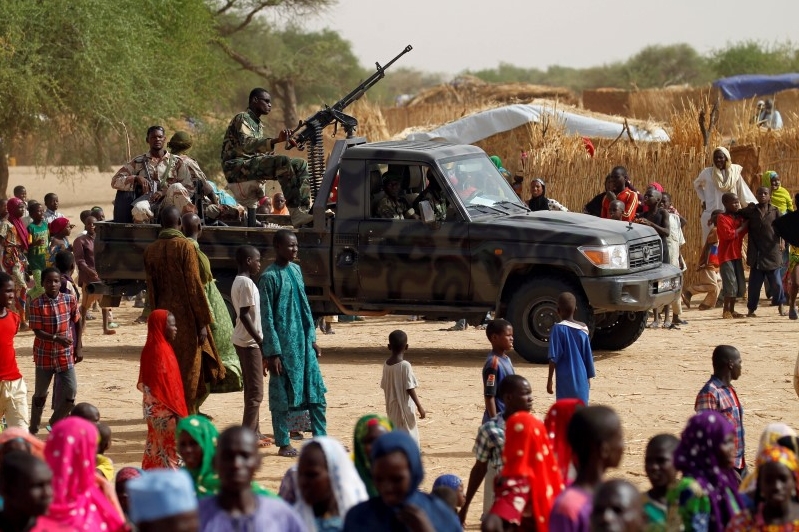
A year after Muslim Fulani herdsmen slaughtered an estimated 300 predominantly Christian farmers in Agatu, Benue state, deadly attacks continued in the state the first 10 weeks of the year, sources said.
More than 29 Christians in Agatu and other rural areas were reported to have died in attacks on predominantly Christian communities in Nigeria's Benue state this year. On Saturday (March 11), suspected Muslim Fulani herdsmen killed at least six Christians in Tombo-Mbalagh, Buruku Local Government Area (LGA), according to local reports.
Justina Sorkaa, Sole Administrator for the council area of Buruku LGA, told reporters on Monday (March 13) that the victims were members of area congregations of the Anglican Communion. She said the bodies had wounds from bullets and machete cuts.
On Friday (March 10), Muslim Fulani herdsmen said to be from Taraba state met resistance when they tried to graze their cattle on prohibited lands in Mkgovur village, in Benue state's Buruku LGA, and later in a reprisal attack they killed eight Christians, according to reports.
Earlier, members of the Universal Reformed Christian Church (NKST), Roman Catholic Church and the Methodist Church were killed in Agatu and in Christian communities in Mbahimin, Ipiga, Ajegbe, Edumoga, and Ogege, sources said.
Herdsmen on Feb. 24 killed 10 Christians in Mbahimin village, Gwer East LGA, an area church elder told Morning Star News.
"Farms belonging to Christians were destroyed and their houses burned down," NKST elder Tersoor Hwande said.
Among those killed were Jimmy Angbian Ugon, Benjamin Iorcher Agah, and another Christian identified only as Puusu, all members of the NKST church, he said. Hundreds of villagers were displaced, he added.
In Edumoga village, in the Okpokwu Council Area, Muslim Fulani herdsmen killed five Catholics in an attack in the early morning hours of Jan. 5, according to area resident Josephine Akioyamen.
She told Morning Star News by phone that the attack was the second in the area, as the herdsmen also attacked Ogege village in January.
"Our people are being hunted and hacked down in their sleep by these herdsmen," she said.
Other Christian communities Muslim Fulani herdsmen reportedly attacked were Ipiga village on Jan. 23 and Ajegbe village on Jan. 22, the latter while church services were underway. Survivors reported high casualties, but details were not available.
Last year between Feb. 22 and Feb. 29, Muslim Fulani herdsmen attacked predominantly Christian Agatu, killing an estimated 300 people. The heavily-armed herdsmen reportedly slaughtered at least eight others on March 8, 2016 in Benue's Logo LGA.
Benue Gov. Samuel Ortom on Monday (March 13) told reporters in Ugba village, which was attacked on Saturday (March 11), that incessant Muslim Fulani herdsmen assaults have been unwarranted, and that security agencies have failed to make any arrests.
"My people are killed, displaced, vulnerable and above all, rendered homeless in their fatherland," said Ortom, a Christian.
In the Nigerian capital of Abuja on Jan. 31, Ortom told reporters that in 2013 in his home village, his house was burned down, more than 50 Christians were killed and their farms were destroyed.
Ochepo Entonu Adamu, a member of the National Assembly, told reporters this week that the attacks on Thursday (March 9) in Agatu LGA were particularly gruesome.
"There is mayhem going on, as women and children are being raped while the men who try to react are being hacked to death," he said in Abuja.
Entonu Adamu, who represents Apa/Agatu, had earlier told lawmakers that the federal government should disarm the herdsmen as it had disarmed young men of the attacked farming communities. The Ortom administration disarmed most people in Benue state in a 2015 amnesty program, and the governor appealed to villagers to remain law-abiding in the face of attacks by the herdsmen.
In his remarks to the National Assembly, Entonu Adamu urged the government to designate the militant Muslim Fulani herdsmen as a "terrorist group" so that the government could take more decisive action against them.







